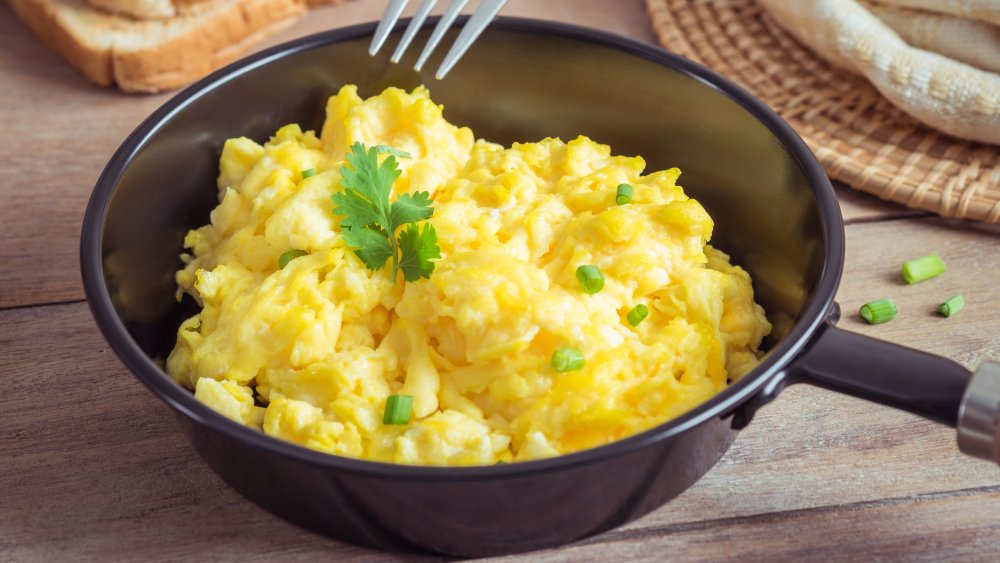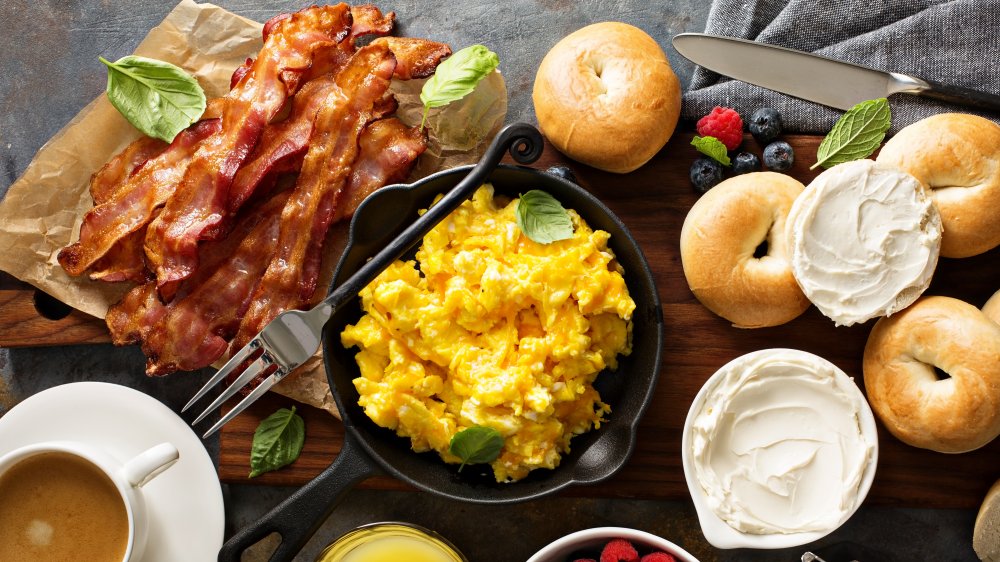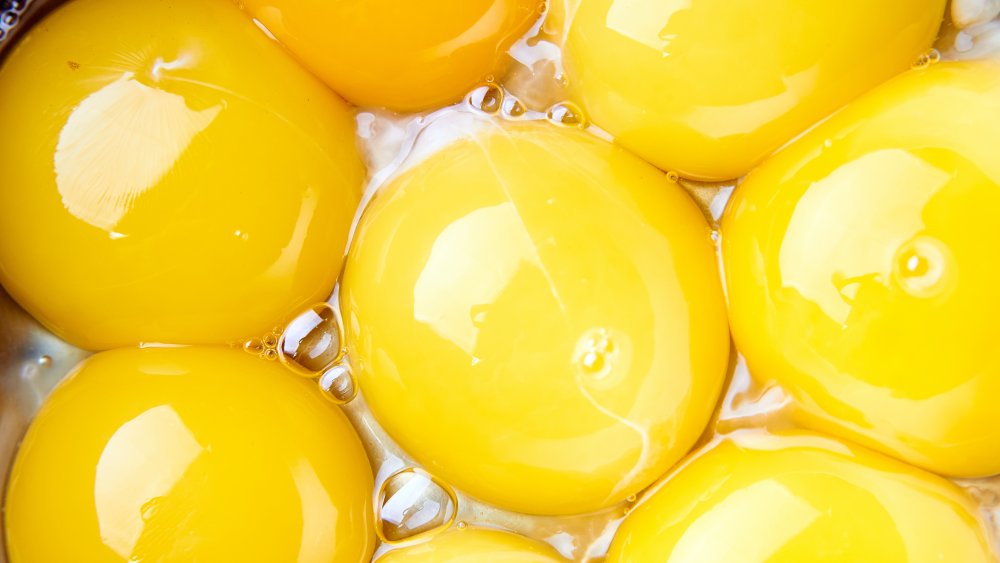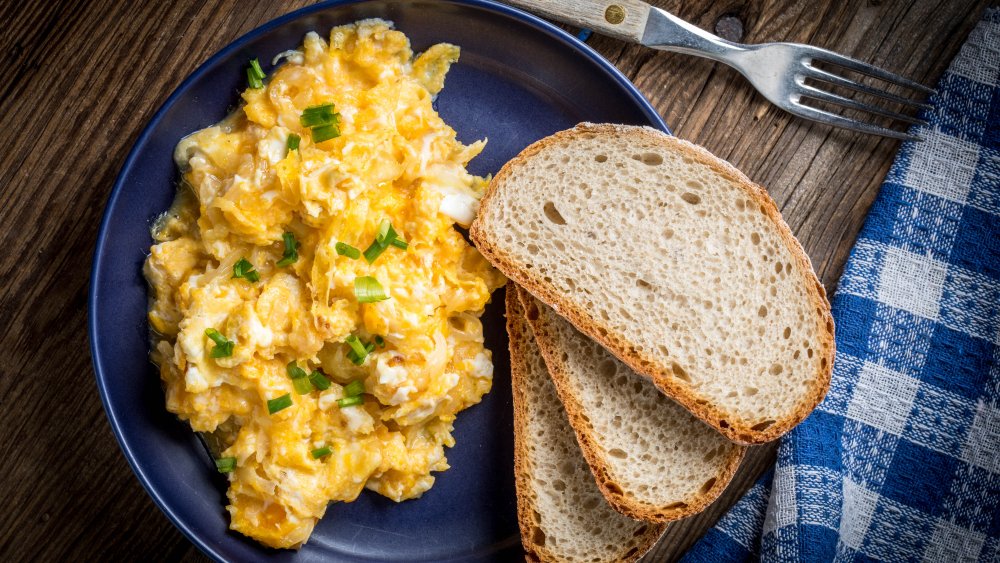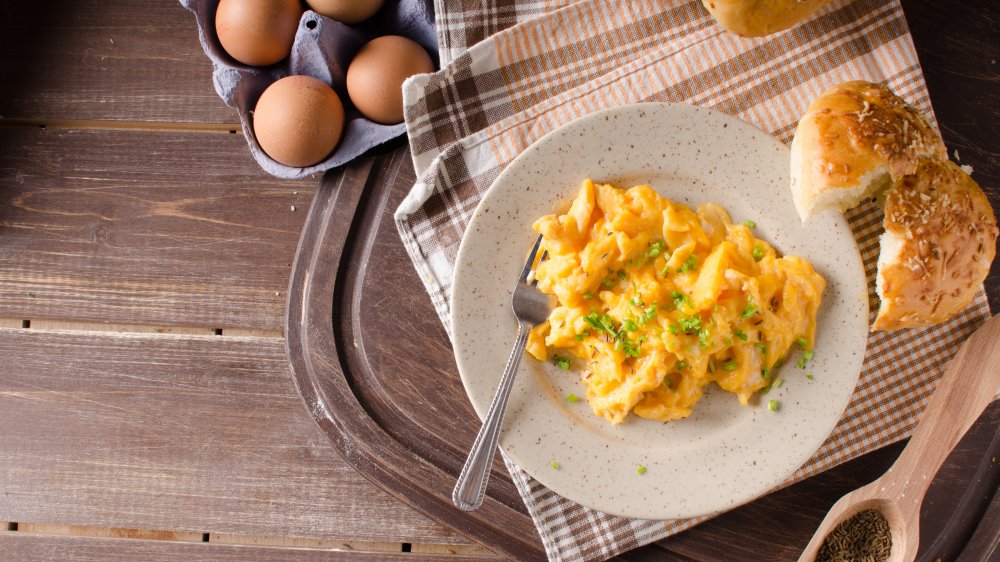The Real Reason You Shouldn't Add Milk To Your Scrambled Eggs
On toast, with bacon, or just on their own, scrambled eggs are a classic breakfast comfort food. But just because they're simple and don't require many ingredients doesn't mean that they're easy to cook. Quite the opposite, actually. Scrambled eggs that aren't too runny, gummy, or overcooked are quite the challenge to prepare.
If you're having problems with your scrambled eggs, part of the reason may be because you're using milk in them. The cook in your family may have taught you from a very early age that a dash of milk or cream is always added to scrambled eggs, but it's time to reexamine that notion. If you're using good and fresh farm eggs that have yolks that are closer in color to orange than yellow, you don't need to add anything save for some salt and perhaps pepper to taste. If you're having scrambled egg problems, all you have to do is remove the dairy from your recipe and you should be improving on your preparation in no time.
What does milk do to scrambled eggs?
The addition of milk or cream to your eggs causes a number of problems. For one, adding a dairy product takes away from the eggy taste of the scrambled eggs (via Huffington Post). Milk also changes the texture of the mixture, which can cause them to turn out rubbery. Adding milk or cream to the eggs increases the liquid content in the pan which heightens the chance of them coming out too runny, as well. And to compensate for this, you may be tempted to keep the eggs on the stove, which will result in overcooking them.
British Michelin starred chef Luke Selby agrees with this notion saying that putting milk in scrambled eggs is a "cardinal sin," which makes them "too wet" like school cafeteria food (via The Mirror). If you care about how your food looks, that's another reason to steer clear of dairy. The white color of milk or cream will lessen the vibrant orange or yellow color of your eggs (via Southern Living).
Another famous chef opts for no milk
On the other side of the Pond, chefs like Anthony Bourdain agreed with Selby's assessment, saying that using any other dairy product besides butter in making scrambled eggs detracts from the dish because, according to the late, great Bourdain, "It should be principally about the egg" (via Good Housekeeping). Bourdain pitched his own scrambled egg recipe which involved just eggs, butter, and salt and pepper for seasoning.
Those who tried out the method found that it resulted in rather large and distinct egg pieces rather than a homogeneous mixture like some are used to. Bourdain noted that although the result is somewhat unconventional, it is actually a positive development as it allows people to experience the texture of the egg while still keeping the mixture light, airy, and fluffy. Of course, if you have a limited number of eggs and you're trying to feed a large group, a splash of milk can help to "stretch [out]" the eggs you're working with.
What you should add to your scrambled eggs instead
If the thought of adding nothing to the bowl as you whisk up your eggs is too much for you to bear, there is something you can add to your dish. Bon Appétit associate food editor Claire Saffitz recommends adding a knob of butter into your scramble "for really luxurious eggs," but only at the end of the cooking process. Bon Appétit's digital food editor Dawn Perry uses olive oil instead of butter but concedes that butter is better if you don't mind a little indulgence.
If you're on the fence about adding butter, know this: Cook's Illustrated, the authority on all things food, reports that omelets made with butter really are better, and don't come out nearly as rubbery. The test kitchen added a tablespoon of diced cold butter into the mix with three whisked eggs to delicious results. "The eggs with butter cooked into a markedly creamier omelet than the eggs without butter and tasted rich, not greasy."
There you have it. If Cook's Illustrated says no milk is required, there's no reason to reach for the carton next time you make a plate of scrambled eggs.
Chefs who didn't get the memo
Almost every food rule has its dissenters and some chefs aren't yet hip to this way of making scrambled eggs. Gordon Ramsay, for example, adds a dash of creme fraiche to his preparation (via Youtube). The creme fraiche is added at the end in order to cool down the eggs after removing them from the stove to prevent them from overcooking. Though his recipe calls only for half a tablespoon, and while it's not technically milk, when it melts into the eggs, it imparts the same effect.
If you're really hellbent on adding some dairy to your morning eggs, there's an alternative. Consider making a quiche instead (via House of Yumm), which all chefs can agree needs some dairy in the egg mixture. As Bourdain noted when warning home chefs about the use of milk, "You're making scrambled eggs, not a quiche."
